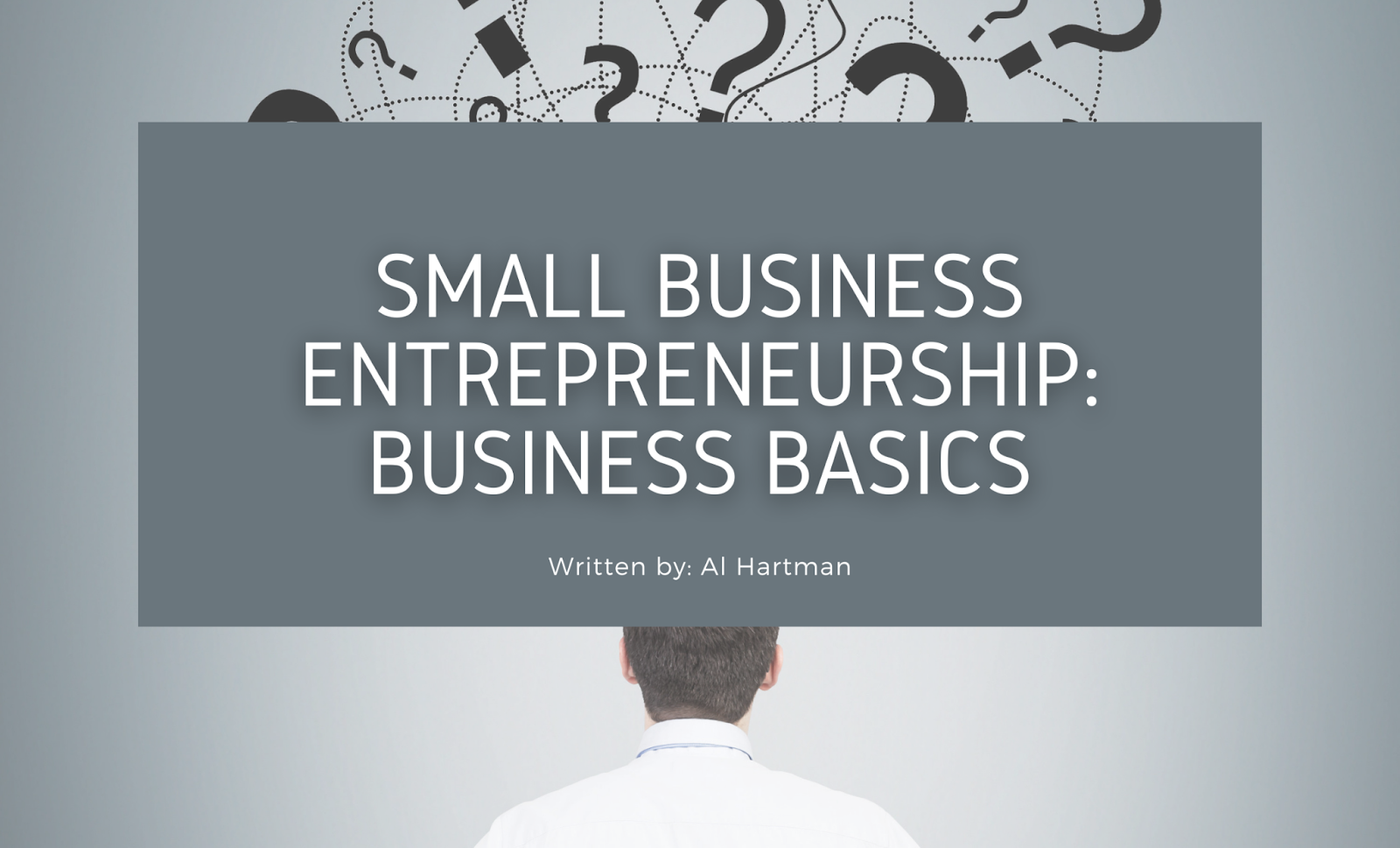Small business entrepreneurship is the process of setting up a small business — and assuming the financial risk and enormous amount of work that comes with it — in the hope of making money. It’s often a decades-long road, and it doesn’t always lead to success.

No matter how long the journey is, you have to start somewhere. If you want to be a successful entrepreneur but are unsure of where to start, this blog is for you. In this post, I will cover business basics for small business entrepreneurship and how to get started on your path to success.
I was a once small business entrepreneur myself, so I have some relevant experience to draw from. To illustrate the business basics I discuss below, I will share some examples from my own career. Read on to learn more.
Want more insights from an established entrepreneur? Read my monthly CEO letter.
Where to Start
Before you establish a sole proprietorship or form a limited liability company (LLC), you need to understand your “why.” Why are you starting this business? Why does this particular expression of small business entrepreneurship interest you?
Your “why” doesn’t necessarily have to be profound or world-changing, although it certainly can be. It simply has to motivate you. The answer to my “why” was simply that I wanted to find a way to shelter my income after making money selling home improvement services. That “why” was enough to lead to a company that now manages more than 60 commercial properties, has a staff of around 200 people and generates more than $100 million in revenue each year.
The following are some common reasons why entrepreneurs start their small businesses:
- To create a legacy, whether that is a financial legacy or an impact on the world
- To bring more personal freedom into their lives by being in charge of their own work
- To enable themselves to do what they love
- To meet a need they perceive in the world around them
- To make more money than they can as an employee
You may find your “why” in the list above, or you may have to do some soul searching to find it. Either way, you need to figure it out before you move forward.

Characteristics That Define a Small Business Entrepreneur
What does an entrepreneur do? What sets them apart from the rest of the working world? They find a way to keep going in the face of incredible odds. They put in the work it takes to make it work, and they don’t let fear or risk stop them. I like the way Elon Musk puts it:
“If something is important enough, or you believe something is important enough, even if you are scared, you will keep going.” – Elon Musk, CEO of Tesla Motors and SpaceX
This is not something you will hear in a course about business basics, but simply having an idea and starting a business is not small business entrepreneurship. You have to be the mastermind of the strategy behind your entrepreneurial endeavors. You have to find a product or service that the market actually needs, come up with an idea to satisfy that need and take on all the risk involved in bringing the idea to life.
In other words, not everyone who has a sole proprietorship or an LLC is a small business entrepreneur. Business owners who become successful entrepreneurs are self-motivated, focused, committed to lifelong learning, able to make human connections and willing to seek help from experts. These are the characteristics you need, and if you don’t have them naturally, you need to develop them.
One characteristic I will add to that list is being willing to sacrifice. This is one of the most common failures of those who don’t make it as small business entrepreneurs. In the early years of my company, I had to sacrifice my own time to an extreme degree in order to overcome various business challenges. Building Hartman Income REIT Management Inc. took every spare moment away from my personal life. I didn’t get married until I was 42 years old. Waiting that long for marriage was an enormous sacrifice — but it gave me the time I needed to build my business.
Basics of Small Business Entrepreneurship

There is no roadmap or complete guide to business basics that will give you a play-by-play list of things to do as you break into small business entrepreneurship. However, I can share with you some basics that you will almost certainly have to address as you move forward with your business.
Core Values and Vision
What does an entrepreneur do to set their business apart from the rest? They develop a unique vision and powerful set of core values. I encourage you to take plenty of time as you set the vision and core values for your company. The right choices here can guide you to financial success for decades.
For example, I have emphasized biblical principles and honoring God in the core values of Hartman Income REIT Management Inc. That means we care deeply about our customers, investors and employees, honor commitments, remain accountable and celebrate achievements that further our vision as a company. These guiding principles have helped us to create a leasing experience that customers can’t find anywhere else.
Competitor Analysis
Who is already doing what you’re planning to do? You need to understand your competitors before you make major decisions about your company. Analyzing the competition gives you direct, actionable insight into gaps in the market, things you could do better and parts of the market that are saturated.
When you take a long, hard look at the competitive landscape, you will also see what has worked. Note the key factors that define success in the industry you are about to enter. Emulate them, but always look for ways to innovate, too.
Target Market
Who is your audience? Know your customer as well as you know yourself. With an in-depth understanding of your customers, you can predict their behaviors and adapt your business strategy to meet them where they are.
To identify your target market, start by picturing the person you believe would benefit most from your product or service. Ask yourself about their circumstances — their background, income, age, location, values and beliefs. Answering these questions is an important task whether your customers will be other businesses (B2B) or individual consumers (B2C).
Financial Planning
How are you going to fund this? Financial planning is one of the most important parts of small business entrepreneurship in general.. The first question to ask is where your funding is going to come from. Are you going to have investors or bootstrap it? Are you going to personally fund it? In either case, how do you plan to make that work before you have a stable customer base?
It’s also important to look to the future in this step. Over the long term, will you invest heavily in expanding your company? Will you be able to create enough value to satisfy your investors? Answer questions like this honestly, and if the answers don’t hold up, make changes to your strategy until they do.
Timeline

How long do you have to make this work? This may be the most important step in building your business strategy: laying out your timeline. Be as specific as possible. Having a defined time frame for your entire business plan will keep you and all other stakeholders accountable. Without a timeline, you can’t set proper goals. And goals are the key to moving any business forward.
Remember to be realistic in your time frame. Planning a new entrepreneurial venture is exciting, but don’t become so over-eager in your goal-setting that you start making mistakes and setting unrealistic expectations.
Are You Ready for Small Business Entrepreneurship?
Millions of people are leaving their jobs in search of something new. Many of them are landing on small business entrepreneurship. Those who have already made the leap didn’t know something you don’t know. They didn’t know it was the perfect time to quit their jobs because no one knows that.
Those who are successful in their new ventures will share this experience: they carefully weighed the considerations we have discussed in this article and laid out a clearly defined path to their entrepreneurial goals. That’s all you have to do — understand your business basics and build a clear and specific business strategy. Every great entrepreneur started somewhere. Make sure you start on firm ground.
To better prepare yourself to be a leader and entrepreneur, check out my book recommendations.





